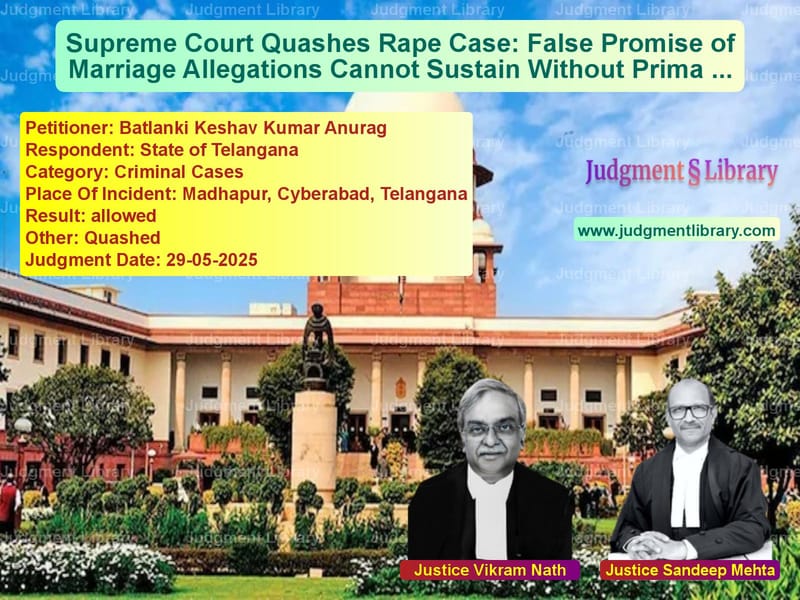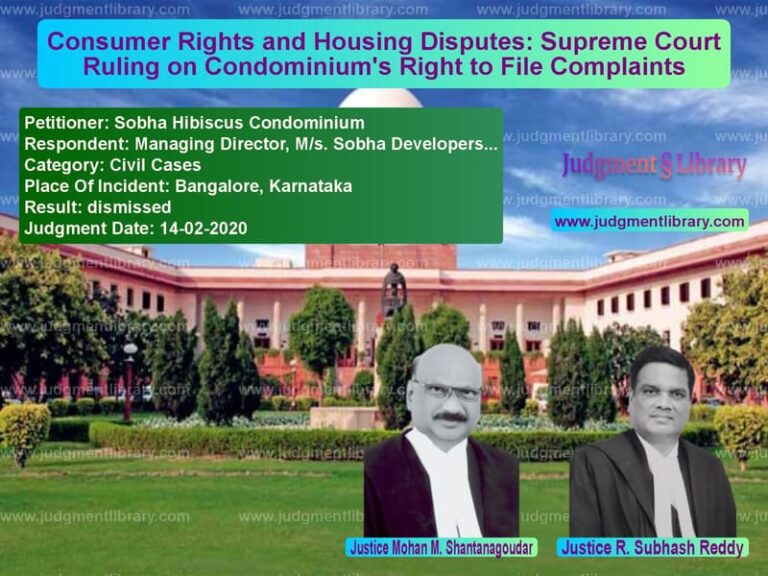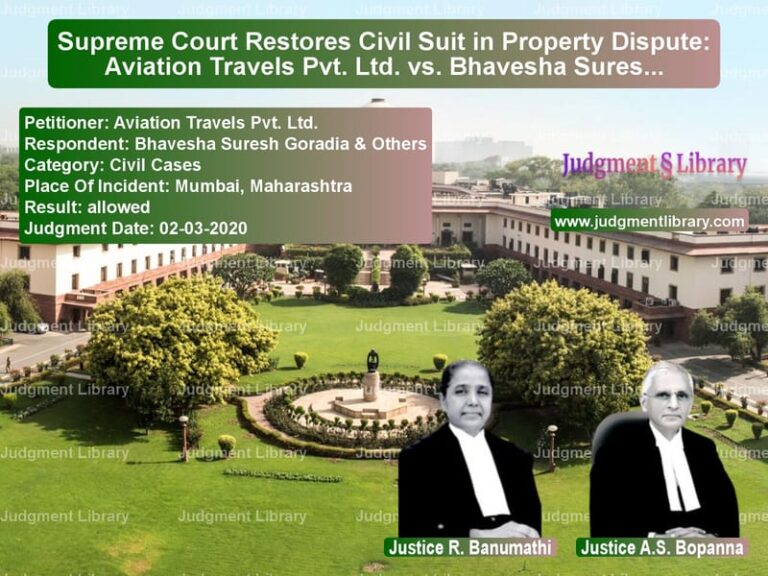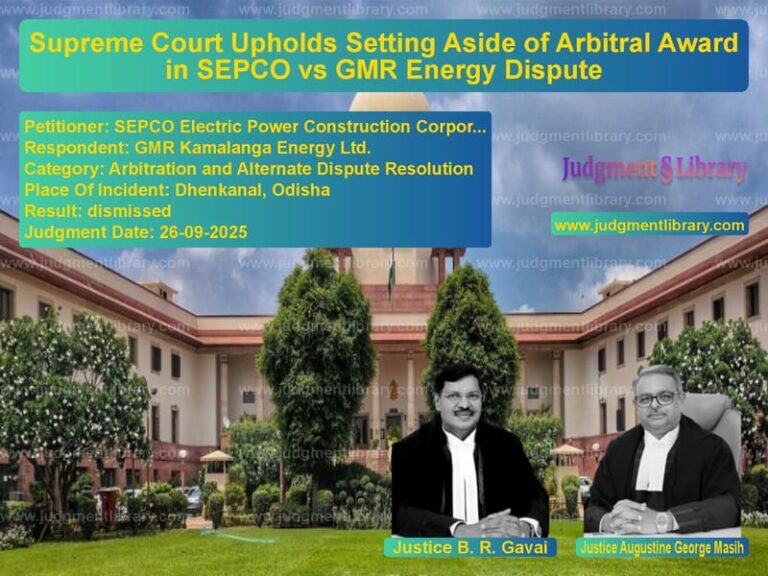Supreme Court Quashes Rape Case: False Promise of Marriage Allegations Cannot Sustain Without Prima Facie Evidence
In a significant judgment delivered on May 29, 2025, the Supreme Court of India quashed criminal proceedings against a man accused of rape and atrocities under the SC/ST Act, holding that the allegations of sexual intercourse under false promise of marriage were not substantiated by prima facie evidence. The case involved Batlanki Keshav Kumar Anurag as the appellant and the State of Telangana along with a woman complainant as respondents, highlighting the complex interplay between consent, promise of marriage, and criminal liability in relationships.
The legal battle began when the de-facto complainant filed multiple FIRs against the appellant, alleging that he had established sexual relations with her under the false pretext of marriage and later refused to marry her. The first FIR (Crime No. 751 of 2021) was registered on June 29, 2021, under Sections 417 and 420 of IPC, followed by a second FIR (Crime No. 103 of 2022) registered on February 1, 2022, under Section 376(2)(n) of IPC (rape) and Section 3(2)(v) of the SC/ST (Prevention of Atrocities) Act.
The complainant’s case was that she had met the appellant through ‘Bharath Matrimony’ website while he was residing in the United States. They agreed to marry, and the wedding was fixed for January 6, 2021. However, the appellant avoided the scheduled date and returned to the US without marrying her. When he came back to India, he established sexual relations with her against her wishes on multiple occasions between May and June 2021. The complainant alleged that the appellant and his mother had signed a written agreement at the police station promising to marry her, but they later showed reluctance and made excuses to avoid the marriage.
Read also: https://judgmentlibrary.com/supreme-court-cancels-bail-in-murder-case-land-dispute-turns-deadly/
Before the Supreme Court, the appellant’s counsel presented several compelling arguments. “Learned counsel appearing for the accused appellant has placed on record certain photographs of the de-facto complainant depicting that she is trying to indulge in self-harm. The translated transcripts of the call recordings purportedly exchanged between the accused appellant and the de-facto complainant have also been placed on record to buttress the submission that the de-facto complainant was suffering from Obsessive Compulsive Disorder (OCD) and was repeatedly pressurizing the accused appellant to indulge in sexual relations.”
The appellant’s counsel further argued that “the bona fides of the accused appellant are clear since the very inception and the same is evident from the fact that he had made all logistic arrangements for the marriage, including booking of the venue/hotel, etc. However, it was only after observing the aggressive sexual behaviour of the de-facto complainant that the accused appellant panicked and was compelled to back out from the union with the de-facto complainant.”
One of the most crucial arguments advanced by the defense was regarding the inconsistencies between the two FIRs. The counsel pointed out that “in the subsequent FIR bearing Crime No. 103 of 2022, which was impugned before the High Court, the de-facto complainant exaggerated and manipulated the facts and alleged that the accused appellant indulged in forcible sexual relations with her on multiple occasions by deceiving her under a false promise of marriage. The incidents of sexual intercourse which are set out in the impugned FIR are dated 4th May, 2021; 11th May, 2021; 28th May, 2021 and 7th June, 2021. Learned counsel urged that if, at all, any such incident had occurred with the complainant on these dates, she would not have omitted to mention about the same in her previous FIR i.e., Crime No. 751 of 2021.”
The defense also emphasized the complainant’s educational background and maturity, arguing that “the de-facto complainant is an educated woman aged 30 years and if, at all, any physical relations were established between her and the appellant, the same were with her own free will and consent and there was no element of force, coercion or deception on the part of the appellant.”
On the other side, the State opposed the quashing petition, with learned counsel for the State arguing that “in the present case, the accused appellant was acting with mala fide intention since the very inception as he developed sexual relations with the de-facto complainant on the false promise that he would marry her and later, he resiled from the promise. It was further urged that as serious allegations of forceful sexual relations are levelled against the accused appellant, this Court should refrain from entertaining the prayer of quashing of the FIR made on behalf of the accused appellant.”
The Supreme Court, after examining the entire material on record, made several crucial observations. The Court noted that “the police has already submitted a closure report dated 6th June, 2024, in FIR No. 751 of 2021 whereas, a chargesheet dated 30th August, 2024, has been filed in FIR No. 103 of 2022. The closure report in the FIR No. 751 of 2021 which has been placed on record, indicates that previously also, i.e., on 23rd January, 2019, the de-facto complainant had lodged a similar complaint at the Police Station, Osmania University, Hyderabad City accusing one ‘Dr. Ranjit Thankappan’, who at the time was working as Assistant Professor in the Department of Communication at Osmania University, for identical allegations of cheating and sexual exploitation on the pretext of a false promise of marriage.”
This finding about the complainant’s history of similar complaints became significant in the Court’s analysis. The Court particularly emphasized the chat transcripts submitted by the appellant, noting that “In the chats which have been placed on record along with the additional documents, the de-facto complainant, who is referred to by the name ‘Muffin’, has admitted that she was manipulative and was trying to ‘get a green card holder’. At one point of time, she also stated that it would not be difficult for her to trap the next one. In the very same breath, she mentions that she would not waste time with the accused appellant and needs to ‘invest on the next victim’. She also mentions that she would irritate her victims to the extent that they dump her, and she could happily start with the next one. She also stated that she was using the accused appellant.”
The Court observed that “These chats depict the stark reality about the behavioral pattern of the de-facto complainant who appears to be having manipulative and vindictive tendency.” Based on this evidence, the Court concluded that “Thus, in our opinion, the accused appellant was absolutely justified in panicking and backing out from the proposed marriage upon coming to know of the aggressive sexual behaviour and the obsessive nature of the de-facto complainant.”
The Court made a significant legal determination regarding the false promise of marriage aspect, stating that “Hence, even assuming that the accused appellant retracted from his promise to marry the complainant, it cannot be said that he indulged in sexual intercourse with the de-facto complainant under a false promise of marriage or that the offence was committed by him with the de-facto complainant on the ground that she belonged to the Scheduled Castes/Scheduled Tribes community.”
The Court also noted the inconsistency in the caste-based allegations, observing that “It is also relevant to mention here that in FIR No. 751 of 2021, the de-facto complainant has not even made a whisper about the accused appellant dumping her on the ground of her caste. Thus, apparently this allegation which has been set out in the subsequent FIR No. 103 of 2022 lodged almost after seven months is nothing but a sheer exaggeration which must be discarded.”
In its conclusive findings, the Supreme Court held that “Upon appreciating the facts and circumstances narrated above and having given thoughtful consideration to the allegations as set out in the FIR and the chargesheet placed on record by the accused appellant, we find that there is no material what to say of prima facie material on record to substantiate the allegations of cheating or sexual intercourse under a false promise of marriage against the accused appellant. The allegations levelled in FIR No. 751 of 2021, dated 29th June, 2021, and the impugned FIR No. 103 of 2022 are at great variance and the inherent contradictions in the two reports over the same subject matter cannot be reconciled.”
The Court emphasized the significance of the complainant’s educational background and the inconsistencies in her allegations, noting that “The de-facto complainant is a highly educated woman aged 30 years. In FIR No. 751 of 2021, she has only alleged about a single sexual encounter dated 24th June, 2021. On the contrary, in the impugned FIR No. 103 of 2022 which came to be lodged on 1st February, 2022, 4-5 such incidents have been referenced each of which ante-date the FIR No. 751 of 2021. It is thus inherently improbable that the complainant would have forgotten or omitted to mention these incidents of sexual intercourse made under a false promise of marriage while filing the earlier FIR No. 751 of 2021 because all the incidents had already taken place as per the version of the complainant up to 7th June, 2021 whereas, the FIR No. 751 of 2021 came to be lodged on 29th June, 2021.”
In its final ruling, the Supreme Court declared that “Having considered the entirety of facts and circumstances as available on record, we are of the firm opinion that allowing prosecution of the accused appellant to continue in the impugned FIR No. 103 of 2022 would be nothing short of a travesty of justice in addition to being a gross abuse of the process of Court. The impugned FIR No. 103 of 2022 is nothing but a bundle of lies full of fabricated and malicious unsubstantiated allegations levelled by the complainant. The facts on record clearly establish the vindictive and manipulative tendencies of the complainant and these aspects have a great bearing on the controversy.”
The Court accordingly quashed both FIRs and all consequent proceedings, allowing the appeal. This judgment serves as an important precedent in cases involving allegations of false promise of marriage, emphasizing the need for consistent and credible allegations supported by prima facie evidence, and protecting individuals from malicious prosecutions based on manipulative and vindictive complaints.
Petitioner Name: Batlanki Keshav Kumar Anurag.Respondent Name: State of Telangana.Judgment By: Justice Vikram Nath, Justice Sandeep Mehta.Place Of Incident: Madhapur, Cyberabad, Telangana.Judgment Date: 29-05-2025.Result: allowed.
Don’t miss out on the full details! Download the complete judgment in PDF format below and gain valuable insights instantly!
Download Judgment: batlanki-keshav-kuma-vs-state-of-telangana-supreme-court-of-india-judgment-dated-29-05-2025.pdf
Directly Download Judgment: Directly download this Judgment
See all petitions in SC/ST Act Case
See all petitions in Fraud and Forgery
See all petitions in Extortion and Blackmail
See all petitions in Judgment by Vikram Nath
See all petitions in Judgment by Sandeep Mehta
See all petitions in allowed
See all petitions in Quashed
See all petitions in supreme court of India judgments May 2025
See all petitions in 2025 judgments
See all posts in Criminal Cases Category
See all allowed petitions in Criminal Cases Category
See all Dismissed petitions in Criminal Cases Category
See all partially allowed petitions in Criminal Cases Category







